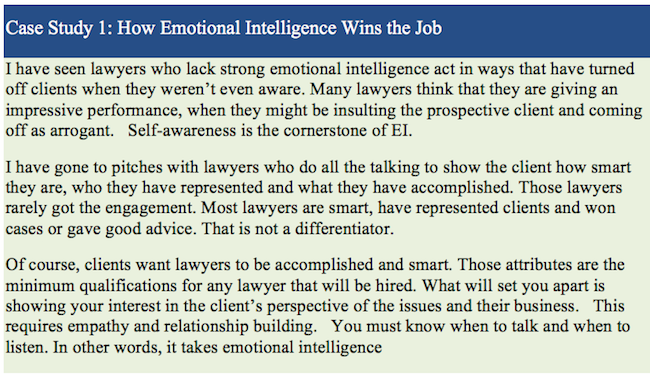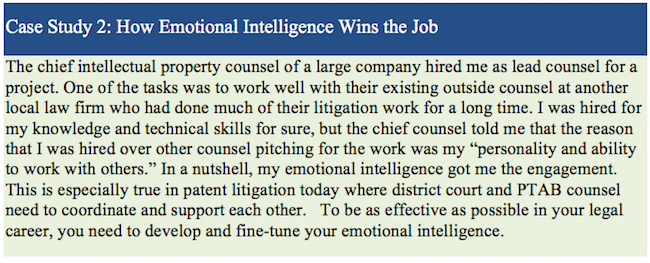EDITOR’S NOTE: We are starting a new series of articles today authored by former USPTO General Counsel Bernie Knight, who is launching a coaching/counseling service for lawyers and executives. His website is www.attorneyexecutivecoaching.com. Bernie has two degrees in psychology, is a licensed professional counselor in DC and a certified executive coach. Bernie approached me to see if we had interest in publishing his articles on IPWatchdog relating the work-life issues facing lawyers and executives and I thought this series would be of interest to many within the intellectual property community, so we hope you enjoy this series and gain usable insights. Bernie also practices law at McDermott, Will and Emery in intellectual property litigation.
_________________
Patent lawyers are labeled as science geeks and somehow that has been associated with us having less interest in the emotional side of things. As a former USPTO general counsel, I have seen more than a few patent lawyers get emotional about topics ranging from the meaning of inequitable conduct to the ability of the USPTO Director to raise fees. However, in interactions with other people or in responses at meetings or public events we all need a healthy dose of emotional intelligence to be persuasive.
Lawyers need emotional intelligence skills. Emotional intelligence is the key differentiator between success and failure. To obtain that critical advantage in securing new engagements or obtaining that corporate, association or government promotion, we can learn how to optimize our emotional intelligence.
Do You Know Your Emotions and How They Affect Behavior and Relationships?

pramit_marattha / Pixabay
“The higher the rank of the person considered to be a star performer, the more emotional intelligence capabilities showed up as the reason for his or her effectiveness.”
Many organizations focus on cognitive intelligence or IQ as the primary factor in hiring and promoting. Research shows that this is the wrong approach. Goleman points out that, given the necessary amount of IQ to do any job, more cognitive intelligence doesn’t necessarily increase performance or land that sought-after promotion. Rather, the key ingredient for success is Emotional Intelligence (EI). This is particularly relevant to a lawyer’s ability to obtain a corporate or government promotion or to generate new business.
Get a Greater Return by Focusing on Your Emotional Intelligence Skills
Stop focusing on IQ and look at EI if you want to get ahead and succeed.
IQ is static from about age 17, so reading more law books will not make you smarter. Learning more law in your practice area is great, but you might find that assessing and practicing your EI set of skills will provide a more immediate return both professionally and personally.
Greater emotional awareness and strength will make you more effective with your colleagues, clients, friends and family. You need to be attuned with your client’s emotions as well. For example, if the client is anxious about a project, you must be able to read that and respond accordingly. If you seem too relaxed when the client is anxious about an issue, you will look unconcerned. This is the cornerstone of the EI skill empathy, discussed in more detail below.
What is Emotional Intelligence? Can it be Measured? Can it be Learned?
EI is a set of emotional and social skills that affect our thoughts, interactions, coping strategies, motivations and general psychological well-being. It affects our behavior every second of our waking hours and controls our relationships with our family, business associates, partners and clients.
Like IQ, EI can be measured. The EQ-i 2.0 is an assessment tool composed of 16 elements. Your score on the EQ-i relates to your potential for performance—it’s not a performance measure itself. Below is a model that presents the various elements of EI.

A unique and very important aspect of the EQ-i is that it also reports a composite score for well-being and overall happiness. You have every right to be happy and the good thing is that you can learn to live a happier and more productive life.
Unlike your IQ (which is fixed at about age 17), EI can be trained (learned) and altered (increased or decreased). Yes, some people have too much of an EI element and that can lead to problems. For example, too much self-regard makes you look arrogant and full of yourself. Instead, a healthy dose of EI makes you confident, yet humble.
If you know your EI strengths and weaknesses, you can decide if various EI elements need to be enhanced or downplayed for you to be as effective as possible at work and in your personal life. That’s where the EQ-i 2.0 assessment tool plays an important role. You will receive a detailed report of your EI scores on all 16 elements.
We can then go over your scores and discuss your strengths and weaknesses as well as any surprises. This gives you a starting point to discuss the elements that you might benefit from increasing or decreasing, and how to go about doing that. You can then put together a strategy for enhancing your use of your EI skills.
How Can Emotional Intelligence Help Lawyers?
The areas where EI can improve the performance of lawyers is limitless. EI affects all behaviors and interactions and has been shown to be the most important differentiator between success and failure. Here are some of the key areas where EI can improve your performance:
- Greater Sales and Increased Revenues.
- Stronger and Effective Client Presentations and Interactions.
- Better Time Management.
- Strong Team Management Skills.
- Enhanced Connections to Firm Management and Other Partners.
- Ability to Stay Motivated and Keep Others Motivated.
- More Effective Problem Solving Skills.
- Enhanced Stress Management and Less Burnout.
- Better Hiring and Promotion Decisions.


Emotional Intelligence in a Nutshell
EI is composed of several components that we are all familiar with but fail to recognize and use to our ultimate advantage. Here are some of the main components:
- Self-Awareness–your feelings and emotions affect your decisions, relationships with others and job performance. Self-awareness requires a good understanding of your strengths and a recognition of your weaknesses. Are you aware of how you’re feeling and how those emotions affect your decisions, analyses and interactions?
- Impulse Control–managing your emotions and actions with others creates trust and a sense of fairness. It is characterized by thoughtfulness and reflection. Do you fly off the handle or act without vetting an issue fully? Do you talk too much in meetings?
- Self-Actualization—the ability to motivate ourselves towards goals. Virtually all effective leaders have this ability. This is a drive to achieve for its own sake. The fun is in setting goals and achieving them. Do you set measurable goals and performance measures for yourself and your team?
- Empathy—ability to appreciate another’s perspective and feelings. Empathy is important to making good decisions and making others feel appreciated and heard. It also enables you to be more sensitive to other cultures and ethnicities. Do you take time to get a sense of what the other person is feeling?
- Optimism–the ability to see hope and expect the best in the face of adversity. This is the core quality of resilience. These folks keep going! Do you look at setbacks as a challenge and a temporary obstacle to your ultimate success?
- Interpersonal Relationships--leaders and lawyers need to establish and manage relationships effectively. Motivation and empathy are not very useful if you don’t have an opportunity to use it.
- Assertiveness–the courage to express your views, even if they may be rejected. This is a core quality of a great lawyer. You must be able to state an opinion before testing the waters. Can you take a risk and state your opinion without being aggressive or feeling insecure?
Improve Your Performance Now
In today’s competitive market, we all need to have the skills available to do our best and to be as impressive as possible. Developing our EI is the key to making us more effective both in our work and in your personal relationships.

![[IPWatchdog Logo]](https://ipwatchdog.com/wp-content/themes/IPWatchdog%20-%202023/assets/images/temp/logo-small@2x.png)

![[Advertisement]](https://ipwatchdog.com/wp-content/uploads/2024/04/Patent-Litigation-Masters-2024-sidebar-early-bird-ends-Apr-21-last-chance-700x500-1.jpg)

![[Advertisement]](https://ipwatchdog.com/wp-content/uploads/2021/12/WEBINAR-336-x-280-px.png)
![[Advertisement]](https://ipwatchdog.com/wp-content/uploads/2021/12/2021-Patent-Practice-on-Demand-recorded-Feb-2021-336-x-280.jpg)
![[Advertisement]](https://ipwatchdog.com/wp-content/uploads/2021/12/Ad-4-The-Invent-Patent-System™.png)







Join the Discussion
10 comments so far.
Anon
June 22, 2017 12:06 pmBenny,
What you see as “personal abuse” is nothing more than an honest assessment that you would do well to think about.
Follow Bernie’s advice: “When people make comments that I don’t appreciate or don’t seem well-placed, I often say “thank you, I’ll consider those points”
Consider the actual words, instead of merely reacting AGAINST those words.
Remember – your post at 3 initiated what you felt as something important to you that you felt about me. But those are merely YOUR feelings and are in no way an accurate representation of who I actually am.
You suffer from the fact that many of our past exchanges have not ended well for you, with your views shown to be more than just a little short in meeting the state of law.
Such might naturally engender negative emotion for you. But your unwillingness to take a step back and realize that what I share is indeed correct only confounds your emotive state.
Please take a step back and think – really think – about these things and the tools that this article presents to you.
Bernie
June 22, 2017 11:35 amThanks for the comments. This is a prime example of a situation where more impulse control and less assertiveness might be effective. Thanks for your kudos. When people make comments that I don’t appreciate or don’t seem well-placed, I often say “thank you, I’ll consider those points.” That usually ends the discussion and makes the point that it’s maybe not worth a response (without counter-attacking). These responses show great assertiveness, but maybe too much under the circumstance. Self-awreness often requires us to look at the situation and assess whether our emotional response is warranted. Here, we may want to sit back and ask ourselves whether a response to a comment is really needed. Please call me if you both want to work through this!
Benny
June 22, 2017 09:15 amAnon,
Personal abuse would get our attorneys fired even quicker than talking over management’s heads.
Is this how you communicate with your clients ?
Anon
June 22, 2017 09:10 amAnd how is this for straight talk; the problem is you and not others.
Anon
June 22, 2017 09:09 amBenny,
Your level of ignorance does not define what whether a remark is obtuse.
You have perhaps unwittingly proven my point.
Thanks.
Benny
June 22, 2017 08:47 amAnon,
That was a rather obtuse response. In fact, it went over my head and I actually don’t know what you mean by “reflections of your psyche” – a term I would normally associate with new age psycho-babble.
Our attorneys straight-talk to us, if they couldn’t make themselves understood they’d be out.
Anon
June 22, 2017 08:17 amBenny,
Your advice does not apply to me.
You may “feel” differently, but those feelings are merely reflections of what is going on inside your own psyche – and there be the source of your issues, and the better aim for your efforts.
Benny
June 22, 2017 05:18 amAnon,
Not a lesson for you, just a couple of words of unheeded advice – verbosity and obtuseness are not positive personality traits. A sense of humour is definitely a plus, though.
Anon
June 21, 2017 07:02 pmI look forward to this series and believe that there can be excellent take-aways.
The only disclaimer that I see right off the bat is that not all the forums out there should employ the same types and degrees of responses. Some forums (and specifically, dealing with certain types of peoples on some forums) require completely different tactics, of which, some may be quite gruff. Other forums, for example, actual correspondences between practitioners and Office personal must be kept civil and professional (that’s not to say that one ‘bends over backwards’ or meekly accepts incorrect actions).
I look forward to lessons that may allow me to sharpen my skill sets. Kudos to Gene and to Mr. Knight.
Elizabeth Lampert
June 21, 2017 01:50 pmVery insightful and on point! This is a must read!